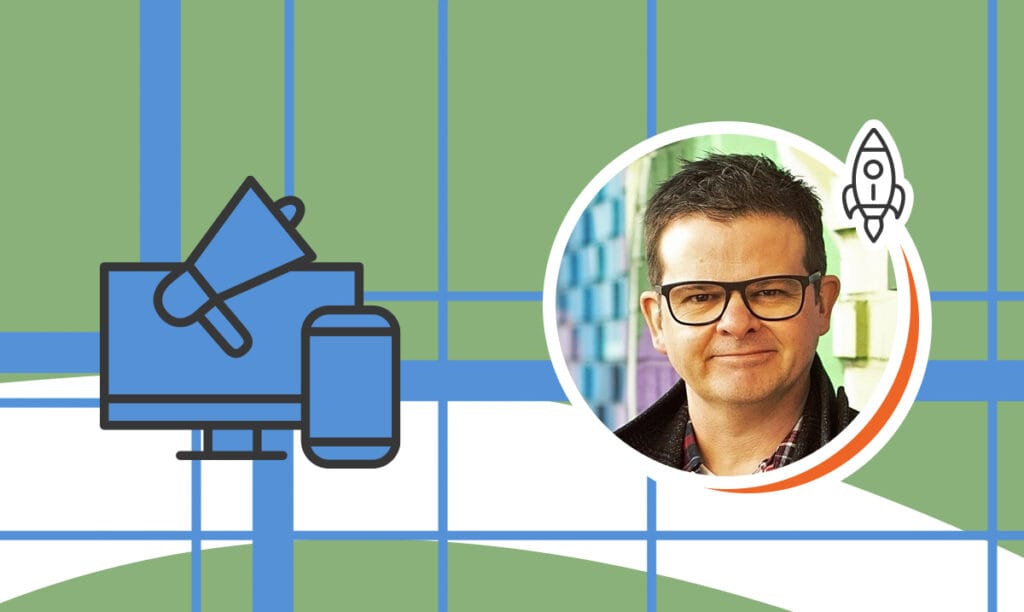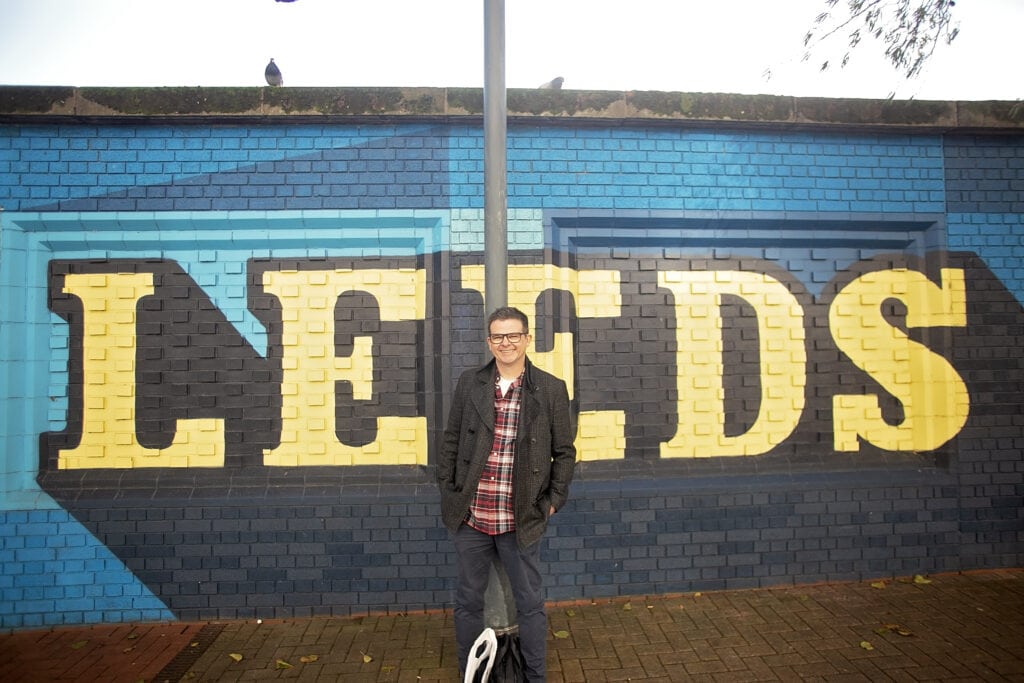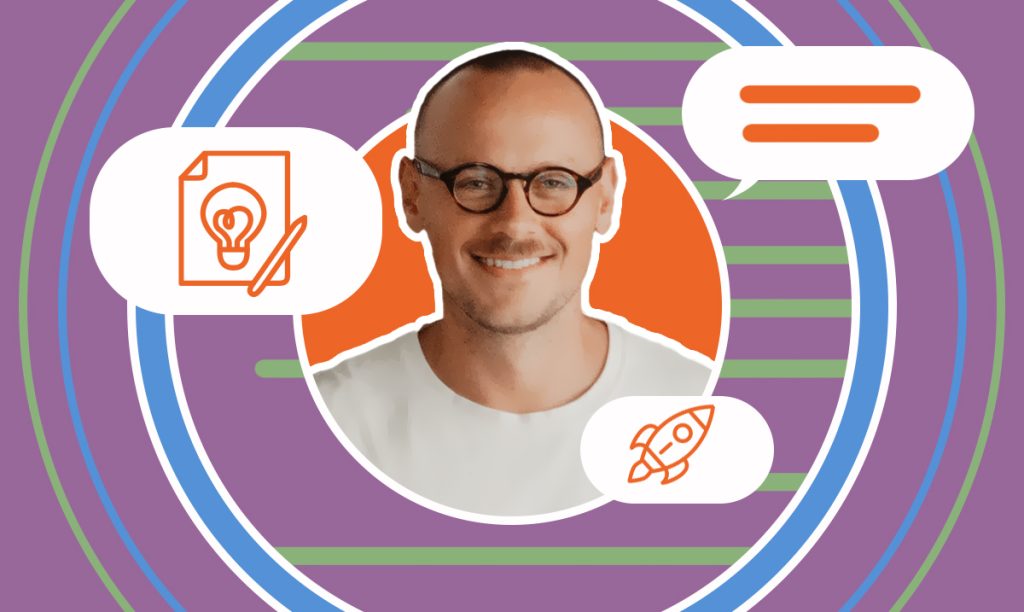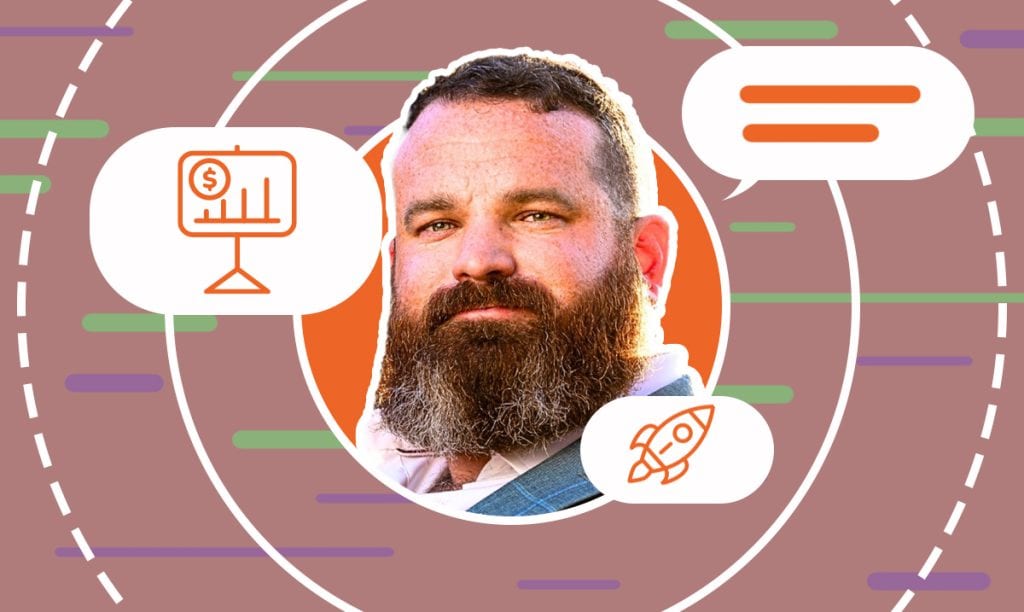Meet Vadim Bozhko, the visionary behind Bozh Studio — a branding and web design business dedicated to helping service-based companies stand out.Fu ...
Richard Michie’s Insights on Digital Marketing Evolution
Written by: Howard Tillerman
Howard Tillerman is the Chief Marketing Officer for Step By Step Business and an award-winning marketing professional.
Published on December 20, 2023

In this insightful interview with Richard Michie, CEO of The Marketing Optimist, we look at his journey from working with big-name brands and agencies to founding his own innovative marketing firm. We explore how he has navigated the evolving landscape of the marketing industry since the 90s, the early indicators of digital marketing’s potential, and how his direct marketing background shapes his current digital strategies.
Richard discusses the challenges of transitioning to CEO, key moments in his career, current trends in digital marketing, and the importance of client relationships. Additionally, we touch on his leadership philosophy, success metrics, and the impact of public speaking and networking on his professional growth. This conversation is a treasure trove of insights for entrepreneurs and marketing professionals alike.
Career Evolution
SBS – How did your experiences working for big-name brands and in agencies shape your approach to founding and leading The Marketing Optimist?
Richard – I have always worked for brands that had very little budget in terms of advertising spending. I think the majority of companies work in that way. Because of that, I’ve always tried to work smarter than just throwing lots of money at a marketing campaign. Working that way makes for a much more creative approach which can help you utilise the money that you do spend on marketing more effectively. If you can make a marketing campaign work using a shoestring budget and a brilliant idea, adding budget and scale can really work. My experience makes me and the agency better thinkers and that’s what helps us stand out.
Adapting to Change
SBS – You’ve seen the marketing industry evolve significantly since the 90s. What strategies have you used to stay ahead in this rapidly changing field?
Richard – Reading and listening. I’m a big business book reader. I find books are the best way to learn from the past, and I combine that with listening. That can mean scouring the internet but also listening to The Marketing Optimist team, customers, my family, and particularly my children. They are much more savvy than me and call me out for being outdated. The kids of today are tomorrow’s customers. If you want to see the future of marketing, watch how kids between the ages of 10 and 16 shop and consume marketing messages.
Digital Transformation
SBS – What were the key indicators in the early days of the internet that convinced you of the potential of digital marketing?
Richard – I’m going to sound really old. The speed.
I worked in direct mail in my early career, so you’d send out thousands of letters or brochures and wait a few weeks for them to deliver and then wait for phone calls and letters to come back.
Send an email with a link to your website, and you will get a response in seconds.
Marketing Strategy
SBS – How does your traditional direct marketing background influence your approach to digital marketing today?
Richard – Planning is the key to direct marketing. Everything counts, from the design of the envelope, the letter design, how long it is, what incentive it uses, the language, and interactive elements. You also had to consider how much it weighed and what day you were sending it. The psychology of direct mail translates to modern-day digital marketing perfectly.
Without realising it, I’m quite technically minded, and I think that’s why I transitioned quite easily between the two disciplines. I was also lucky enough to be there early on.

Business Challenges
SBS – What were the most significant challenges you faced when transitioning from an employee to a CEO, and how did you overcome them?
Richard – I’m still overcoming them! The hardest part is delegation, and I think it always will be. I can do something in five minutes, but it takes me 30 minutes to show someone and delegate. I know that delegating is much better in the long run, but my lizard brain takes over, and I sometimes end up doing things myself.
Key Learnings
SBS – Looking back on your career, what are some pivotal moments or decisions that significantly impacted your professional journey?
Richard – The pivotal moment was after being made redundant, sitting in the job centre feeling totally destroyed. That was the most depressing feeling. In my first interview there, they told me about the Enterprise Allowance Scheme, and I just snapped their hand off. I’d always wanted to run my own business and never had the guts. So being redundant was a blessing in disguise. I literally had nothing to lose.
Industry Trends
SBS – In your view, what are the current and upcoming trends in digital marketing that entrepreneurs should be aware of?
Richard – The biggest trend is undoubtedly AI. AI is going to be both a blessing and a curse. It’s a blessing for the people who can use it constructively to do things that humans can’t do or that we’re not as suited to. The things it has been doing in helping devise new medicines and complex research are going to be fantastic for the human race.
The curse is in generative AI like ChatGPT. The problem here is that these AI models currently scrape existing content, text, and images and repurpose them to suit the prompts given. I have huge ethical concerns with that. I also worry for businesses that see AI as a way to save money on the creative process and bang out lots of content that’s all generated without a human hand or mind. It’s a race to the bottom, and my prediction is the businesses that take a different route and invest in creativity rather than do things on the cheap will have a competitive advantage in the long run.
Client Relationships
SBS – How do you approach building and maintaining strong relationships with your clients in the digital age?
Richard – The digital age is no different from before. Yes, there’s a lot of technology to help you communicate globally and instantly. But the technology doesn’t change people at all. The way to build strong relationships is with trust. If there’s no trust, there’s no relationship. We need to do what we say we’ll do, and in return, we expect our clients to trust us on that. That doesn’t mean we’re always right, but clients choose us because they see The Marketing Optimist as a trusted partner.
We need to communicate clearly at all touchpoints to build and earn trust, and we work hard to do that.
Leadership Philosophy
SBS – As a CEO, how do you foster a culture of innovation and creativity within your team?
Richard – Sorry to repeat myself, but it’s down to trust. I trust the team — both full-time staff and our freelancers to do the right thing. I try my best to support and empower them to make the calls they feel are right for whatever they are working on. It doesn’t mean I’m not critical or will just let anything go, but when you come from a point of trust, you can see that the ideas and creativity are coming from the right place. I have to give them the freedom to be creative because they can’t do it without that.
If I’m micro-managing everything, everything will be my idea. And that’s no good for anyone.
Success Measurement
SBS – What metrics or indicators do you prioritize to measure the success of your marketing strategies?
Richard – It really depends on the client. The obvious one is sales. For e-commerce campaigns, that’s really the only metric that matters. Not all our clients are that clear-cut, though. So many have much softer KPIs like engagement and interaction. It’s really important for us and our clients to be clear on what they want to achieve and set expectations.
It’s also important to understand that not every campaign element leads to a sale and that it’s not possible to measure absolutely everything. The world of marketing is very complicated, and customers are even more complex.
We have a very clear policy to only report on the metrics that are actually usable by the client and nothing more. If they want to zoom in a particular metric we will, but only if it moves the strategy forward.
Public Speaking and Networking
SBS – How has your role as a public speaker and volunteer fundraiser contributed to your professional growth and the growth of your business?
Richard – Before I ran The Marketing Optimist, I co-founded an event called Bettakultcha. That was a speaking event that ran for seven years. The idea was that speakers had five minutes to talk about any subject with 20 slides. Doing so many of those helped me understand how to get a message over to people in a short amount of time, to hopefully encourage them to have further discussions.
Combining that with fundraising for the homeless charity Simon on the Streets gives me a point of empathy with people. Public speaking will help most people grow their business. It’s one of the only times you’ll get hundreds of people listening to you in one place. It’s only getting better with practice.
Advice for Entrepreneurs
SBS – What advice would you give to aspiring entrepreneurs who are interested in entering the digital marketing space?
Richard – I would tell them to meet other entrepreneurs. One of the best things I ever did was join Entrepreneurial Spark, which later changed to NatWest Businesses Accelerator. Being around other people starting up businesses, feeding off their energy, pooling ideas, and sharing knowledge was fantastic. It’s one of the reasons I still love co-working. You hear things and ideas you would never encounter sitting in an office on your own. If you can’t find something like that, get some business cards and go networking. Meet people face to face, get to know them, and then connect online. You’ll have much better relationships that way.
Subscribe to Our Newsletter
and gain insider access to cutting-edge business insights and trends.
Featured Resources

How “Less but Better” Drives Bozh Studio’s Design Edge
Published on April 3, 2025
Read Now

How No Code Map App Delivers Custom Maps Without Coding
Published on April 3, 2025
In this interview, we sit down with Nan Zhou, co-founder of No Code Map App, to discuss how she and her team transformed a trip-planning mapinterfac ...
Read Now

How David Pere Helps Veterans Achieve Financial Freedom
Published on April 3, 2025
In this interview, David Pere, the founder of From Military to Millionaire, shares his inspiring journey from the Marine Corps to financial freedomt ...
Read Now
Comments